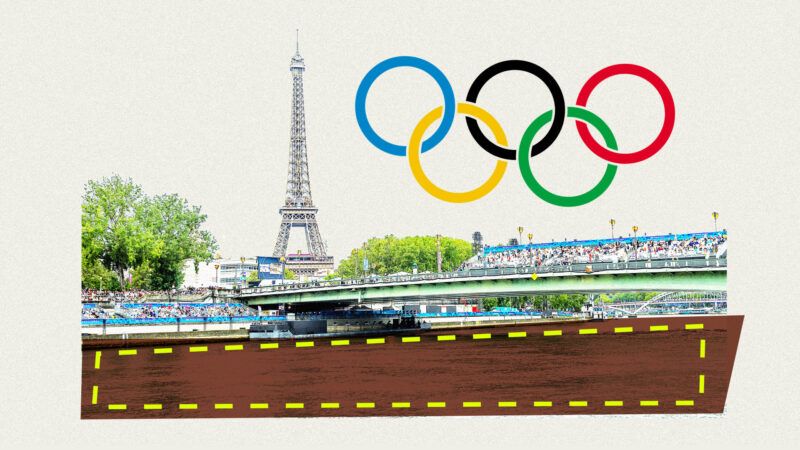Paris Spent $1.5 Billion Cleaning Poop Out of the Seine, and It's Still Too Dirty for Olympic Swimming
Athletes still can't swim in the Seine River after Paris wasted $1.5 billion trying to clean it for Olympic events.

As nearly 10,500 athletes from 184 countries floated down the Seine River in the pouring rain during the opening ceremony of the Paris Olympics at the end of last week, American sports commentator Mike Tirico announced that the E.coli levels in the famous river were "too high" for swimmers to compete in had events been scheduled to take place that day.
Paris knew the Seine would pose some serious health risks—the river has been illegal to swim in for over 100 years. After a spring with an abnormal amount of rainfall, tests of the river's water found that the levels of E. coli bacteria were more than 20 times higher than what World Triathlon considers acceptable. But the mayor of Paris, Anne Hidalgo, still jumped into the Seine earlier this month in an effort to instill confidence that the waterway was just fine. But a small dip is very different from submerging yourself for hours of racing.
Paris hasn't hosted the Olympics in 100 years, and the largest investment the city made for this global event was not a new stadium or sports arena but a $1.5 billion underground tunnel and water storage facility meant to purify the Seine for the triathlon and open-water swimming races. And if this fancy new system designed to clean one of the dirtiest rivers in the world didn't work? Well, Paris didn't feel the need to come up with a plan b other than postponing and possibly changing the triathlon to a duathlon.
This is not the first time water conditions created controversy during the Olympic Games. Time and again countries prioritize the picturesque or television-friendly venues without considering the very real health risks that are present in many of the world's famous waterways. In 2016, Rio de Janeiro wanted to put the swimmers off the beaches of Copacabana, and during the 2020 Tokyo Games the swimmers competed in Odaiba Marine Park—both locations the largest site of each prospective city's sewage runoff.
In Paris, one athlete is taking matters into his own unwashed hands—American triathlete Seth Rider believes he can ward off serious infection by "increas[ing] my E. coli threshold" and not washing his hands after using the bathroom. Other athletes are upping their probiotic intake in the hopes of building a stronger gut to withstand an infection.
The Olympic triathletes had their scheduled training sessions canceled on both Sunday, July 28 and Monday, July 29 because the E.coli level was still too high. And this morning, the men's triathlon, the first race that was scheduled to take place in the Seine, was postponed.
For the 2028 Olympics in Los Angeles, the plan is to host the outdoor swimming events along Laguna Beach, which, for now, appears to be safer than the Seine. But the U.S. should still come up with a backup plan that doesn't involve wasting billions of taxpayer dollars or athletes making questionable hygiene decisions.


Show Comments (61)